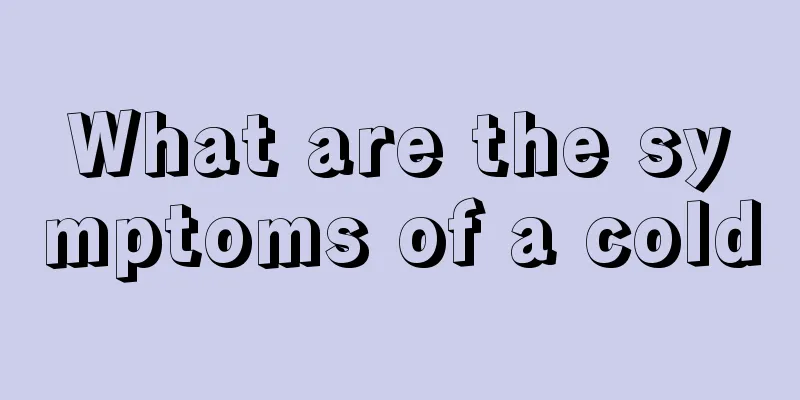What are the symptoms of a cold

|
Generally speaking, when people show the slightest cold symptom, they should go to the hospital for treatment in time, because this will prevent the cold from developing to a serious level, which would make it very difficult to treat. As the most common disease in the human body, colds have many symptoms, and some of them are quite torturous to people. Let's learn about some symptoms of colds today. Clinical manifestations: The incubation period of a cold is 1-3 days, the shortest being just a few hours and the longest being up to 4 days. Simple influenza: more common. The patient has an acute onset of high fever, with severe systemic symptoms but not severe respiratory symptoms. Symptoms include chills, fever, headache, fatigue, body aches, etc. Symptoms include chills, fever, headache, fatigue, body aches, etc., and the body temperature can reach 39-40℃. After lasting for 2-3 days, the symptoms gradually subside and the systemic symptoms gradually improve, but symptoms of upper respiratory tract infection such as nasal congestion, runny nose, sneezing, sore throat, and dry cough are often more obvious. A few may have mild gastrointestinal symptoms. Physical examination shows acute illness, flushed cheeks, mild congestion of the conjunctiva, tenderness of the eyeballs, congestion of the pharynx, and herpes on the oral mucosa. Pneumonia-type influenza: less common. It mainly occurs in patients with existing cardiopulmonary diseases or pregnant women. The clinical manifestations include persistent high fever, shortness of breath, cyanosis, paroxysmal cough, hemoptysis, etc. Physical examination revealed low, full-blown wheezing sounds in both lungs, but no signs of consolidation. The course of the disease may last up to 3-4 weeks. When combined with bacterial infection, it may present as bronchopneumonia or lobar pneumonia. Symptoms include severe cough, purulent sputum, chest pain, lung consolidation or focal pneumonia signs. Toxic influenza: Pneumonia lesions are not obvious, but there is systemic damage to the vascular and nervous systems. There are obvious encephalitis lesions, persistent high fever, confusion, and often delirium. A few cases may suffer from low blood pressure or shock due to vascular nervous system dysfunction or adrenal bleeding. Others: After being infected with the influenza virus, only mild symptoms such as fever, cough, and discomfort may occur. The course of the disease is 1-2 days, similar to other viral upper respiratory tract infections, and is called mild influenza. A small number of patients present with gastrointestinal symptoms such as abdominal pain and diarrhea, which is called gastrointestinal influenza. Specific performance: 1. Wind-cold type cold: headache and fever, no sweat, fear of cold, soreness and fatigue in the limbs, nasal congestion, clear runny nose, thin white tongue coating, and floating and tight pulse. 2. Wind-heat type cold: fever, headache, little sweat, dry mouth, mild fear of cold, sore throat, runny nose, coughing up yellow phlegm, constipation, yellow and red urine, thin yellow tongue coating, and floating and rapid pulse. 3. When secondary upper respiratory tract infection occurs, there may be cough. When secondary bronchitis and lung infection occur, there may be cough, chest pain, rales on lung auscultation, and increased total white blood cell count and neutrophil count in the blood; it may also be complicated by otitis media, sinusitis, etc. Warm reminder: The editor reminds everyone to pay attention to these symptoms in daily life and respond to treatment in time. You must also do a good job of prevention in daily life. You can strengthen physical exercise to improve your body's immunity. If you have a cold, you should seek treatment in time to avoid delaying the disease and causing unnecessary consequences. |
<<: Why do I catch colds so often?
>>: How to cure a cold quickly without taking medicine
Recommend
How long can you live after mid-term surgery for bladder cancer
Bladder cancer is a common urinary system disease...
What to do if you feel suffocated
We often encounter unpleasant things in life. If ...
What supplements should I take for facial paralysis
There are also a large number of muscles on the f...
What are the dangers of scratch disease
Scratch disease, also known as skin scratch disea...
What are the side effects of lip tattoos
This is the first time I’ve heard of lip tattoos,...
Is it life-threatening to faint from an injection?
Getting acupuncture is a very normal condition fo...
How can I cure itchy feet?
A common cause of itchy feet is athlete's foo...
How long does it take for esophageal cancer to recur
After receiving treatment for esophageal cancer, ...
What are the precautions for breast cancer chemotherapy
What are the precautions for breast cancer chemot...
Benefits of taking a bath
In the summer, many people can probably stick to ...
Can hepatitis C be cured? How long does it take to treat hepatitis C?
The symptoms of hepatitis C are not very obvious ...
How long can you live after radiotherapy for brain cancer? What dietary precautions should brain cancer patients pay attention to?
Brain cancer seriously affects our lives. With th...
Diagnosis methods for lung cancer with different symptoms
What are the methods for diagnosing lung cancer? ...
The power of habit and how to develop it
Each of us has various habits. When a person pers...
How many days after conception will you feel hungry?
Once women become pregnant, many changes will occ...









